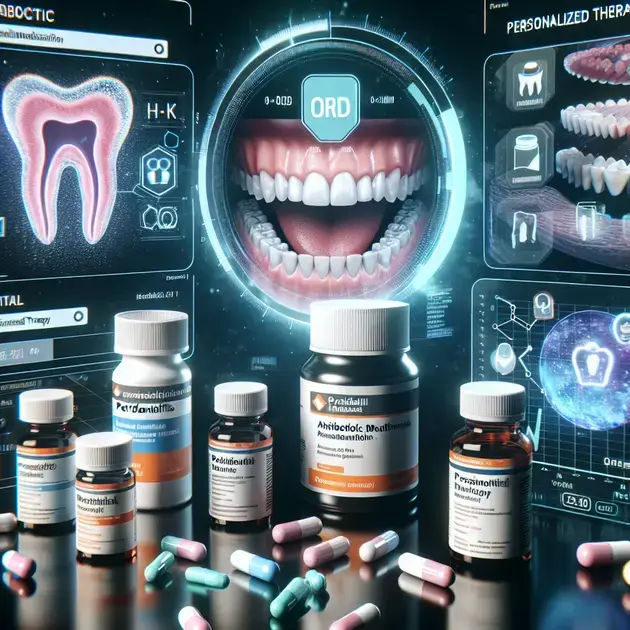Periodontitis is a common yet serious gum infection that can damage the soft tissue and destroy the bone that supports your teeth. To effectively manage this condition, it is crucial to understand the options available for treatment. In this comprehensive guide, we will explore the most effective medications for periodontitis.
Recent studies have shown promising results in the use of antibiotic therapy as an adjunct to conventional periodontal treatment. These medications can help reduce inflammation, control bacterial growth, and support the healing process. In the following sections, we will delve into the details of these effective medications and how they can improve the outcomes for individuals battling periodontitis.

Effective Medication for Periodontitis Explained
Periodontitis is a serious gum infection that damages the soft tissue and destroys the bone supporting your teeth. To effectively treat periodontitis, it’s crucial to understand the different medications available. One common medication used is chlorhexidine mouthwash, which helps reduce bacteria and control inflammation in the gums.
A step-by-step guide to using chlorhexidine mouthwash involves rinsing with it twice a day for 30 seconds each time after brushing your teeth. You can easily find this mouthwash at your local pharmacy or order it online from reputable websites like Amazon or Walgreens.
Another medication often prescribed for periodontitis is doxycycline, an antibiotic that helps fight off bacterial infections in the gums. Doxycycline comes in pill form and is usually taken twice a day for a specified period. You can obtain this medication with a prescription from your dentist or primary care physician.
For more severe cases of periodontitis, your healthcare provider may recommend periodontal surgery in addition to medication. This surgical procedure helps remove deep-seated plaque and tartar buildup, allowing the gums to heal properly.
By understanding the various medications available for treating periodontitis and following the prescribed treatment plan, you can effectively manage and improve your gum health.
Understanding the Importance of Antibiotic Therapy
Antibiotic therapy plays a crucial role in the treatment of periodontitis by targeting and eliminating harmful bacteria that cause gum infections. It is important to recognize when antibiotic therapy is necessary and how it can enhance the effectiveness of other treatment methods.
When prescribed antibiotics for periodontitis, it’s essential to follow the dosage instructions precisely to ensure optimal results. Taking antibiotics as directed helps prevent antibiotic resistance and promotes the elimination of bacteria in the gums.
One common antibiotic used in periodontal treatment is amoxicillin, which is typically taken orally in tablet form. You can obtain amoxicillin with a prescription from your healthcare provider or your local pharmacy.
It’s important to note that antibiotics should not be used as a standalone treatment for periodontitis but rather as a complementary therapy alongside other interventions like deep cleanings or surgery. Consulting with your dentist or periodontist will help determine the most suitable antibiotic regimen for your specific condition.
By understanding the importance of antibiotic therapy in treating periodontitis and following the prescribed guidelines, you can improve the outcomes of your gum disease treatment and maintain better oral health.
Maximizing Treatment Outcomes with Medications
Maximizing the outcomes of periodontitis treatment involves a comprehensive approach that includes the strategic use of medications. By understanding how medications work and integrating them into your treatment plan effectively, you can enhance the success of managing gum disease.
One key strategy for maximizing treatment outcomes with medications is to adhere to the prescribed medication schedule without missing doses. Consistency in taking medications as directed ensures that the drugs can work optimally in combating gum infections and inflammation.
In addition to medications like antibiotics and mouthwashes, incorporating lifestyle changes such as improving oral hygiene practices and quitting smoking can further support the treatment process. These lifestyle modifications can complement the effects of medications and promote better overall gum health.
Regular follow-up visits with your dental provider are essential for monitoring the progress of your treatment and making any necessary adjustments to the medication regimen. Open communication with your healthcare team allows for timely modifications that can optimize treatment outcomes.
By actively participating in your treatment plan, following medication guidelines diligently, and making supportive lifestyle changes, you can maximize the effectiveness of medications in managing periodontitis and achieving healthier gums.

**Understanding the Importance of Antibiotic Therapy**
Antibiotics are crucial in the treatment of bacterial infections, including periodontal diseases. When it comes to managing periodontitis, antibiotics play a vital role in controlling the spread of bacteria and reducing inflammation. It is essential to understand the importance of antibiotic therapy in enhancing the effectiveness of periodontal treatment.
One of the key reasons why antibiotic therapy is important in the treatment of periodontitis is its ability to target and eliminate harmful bacteria that cannot be reached through mechanical cleaning alone. These bacteria can hide in deep pockets around the teeth and gums, leading to persistent infection and inflammation. By using antibiotics, dentists can effectively combat these bacteria and improve treatment outcomes.
Additionally, antibiotic therapy can help reduce the risk of recurrent infections and complications in patients with severe periodontitis. By prescribing the right antibiotics based on the specific bacteria present in the oral cavity, dentists can create a more targeted and personalized treatment plan for each patient, leading to better long-term results.
Moreover, antibiotics can also aid in the management of acute periodontal infections, providing rapid relief from pain and swelling. In cases where periodontitis has progressed to a more advanced stage, antibiotics can be a valuable adjunct to surgical procedures, helping to control infection and promote healing in the affected tissues.
Overall, understanding the importance of antibiotic therapy in periodontitis management is essential for both patients and dental professionals. By incorporating antibiotics into a comprehensive treatment approach, it is possible to achieve improved clinical outcomes and better overall oral health for individuals suffering from this common dental condition.
**Maximizing Treatment Outcomes with Medications**
When it comes to maximizing treatment outcomes, medications play a crucial role in managing various health conditions, including periodontitis. By understanding how different medications work and their potential benefits, healthcare providers can optimize the effectiveness of treatment regimens and improve patient outcomes.
In the context of periodontitis management, medications such as antibiotics, antimicrobials, and anti-inflammatory drugs can help control infection, reduce inflammation, and promote healing in the gums and supporting structures of the teeth. These medications can be prescribed as part of a comprehensive treatment plan to target specific bacteria and prevent the progression of periodontal disease.
By utilizing medications in conjunction with professional dental cleanings, scaling, and root planing procedures, dentists can address the underlying causes of periodontitis and prevent further damage to the gums and bone. This integrated approach to treatment can lead to better outcomes for patients and reduce the risk of complications associated with advanced periodontal disease.
Furthermore, medications can also play a role in pain management and symptom relief for individuals undergoing periodontal treatment. By controlling discomfort and inflammation with the appropriate medications, patients can experience a more comfortable recovery process and better adherence to their treatment plans.
Overall, maximizing treatment outcomes with medications requires a coordinated and individualized approach that takes into account the specific needs and goals of each patient. By incorporating the latest evidence-based practices and utilizing medications effectively, healthcare providers can achieve superior results in managing periodontitis and improving oral health outcomes for their patients.
Conclusion
Understanding the Importance of Antibiotic Therapy
Antibiotic therapy is a crucial aspect of periodontitis management, playing a vital role in targeting and eliminating harmful bacteria that mechanical cleaning alone cannot reach. By effectively combating these bacteria, dentists can improve treatment outcomes and reduce persistent infection and inflammation.
Moreover, personalized antibiotic therapy can reduce the risk of recurrent infections and complications in severe periodontitis cases. By prescribing specific antibiotics based on individual oral bacteria, dentists can create tailored treatment plans, leading to better long-term results and improved oral health for patients.
Additionally, antibiotics can assist in managing acute periodontal infections, offering rapid relief from pain and swelling. In advanced periodontitis stages, antibiotics can complement surgical procedures, controlling infections and promoting healing in affected tissues. Overall, integrating antibiotics into a comprehensive treatment approach is essential for achieving enhanced clinical outcomes in individuals with periodontal disease.
Maximizing Treatment Outcomes with Medications
Medications, including antibiotics, antimicrobials, and anti-inflammatory drugs, play a crucial role in managing periodontitis by controlling infection, reducing inflammation, and promoting healing in gum and teeth structures. By incorporating medications into treatment plans alongside professional dental cleanings and procedures, dentists can address root causes of periodontitis, leading to better patient outcomes and decreased risks of complications.
Furthermore, medications contribute to pain management and symptom relief during periodontal treatment. By utilizing appropriate medications to control discomfort and inflammation, patients can undergo a more comfortable recovery process and adhere better to their treatment plans, ultimately improving overall oral health outcomes.
Overall, maximizing treatment outcomes with medications necessitates a personalized and evidence-based approach that considers each patient’s unique needs and treatment goals. By understanding the role of medications in periodontitis management, healthcare providers can optimize treatment regimens, enhance patient outcomes, and positively impact oral health.



